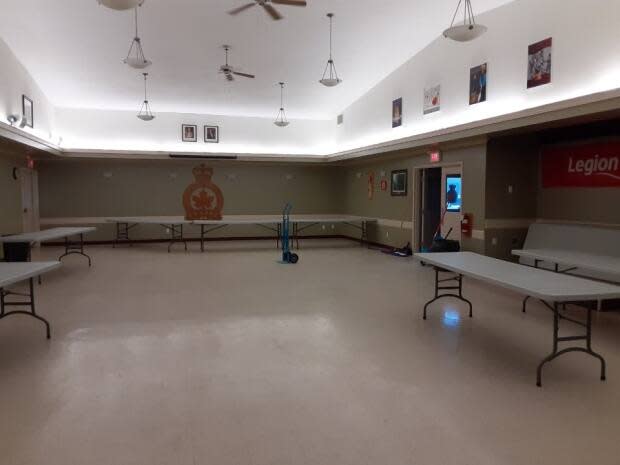Insurance company blocks St. Paul legion from renting space to AHS for COVID-19 testing
A Royal Canadian Legion branch northeast of Edmonton is crying foul after its insurance provider blocked it from renting space to Alberta Health Services for COVID-19 testing, costing it thousands of dollars in much-needed revenue during the pandemic.
The dispute between Wawanesa Insurance and the St. Paul Branch 100 began in September, when AHS approached the legion hoping to rent its building for one year to use as a COVID-19 testing centre, said Harold Lefevere, who manages rentals and maintenance for the building.
"We were interested in that because of the situation right now, we have no income," Lefevere said.
The regular suppers, bar nights and community events that usually generate income have been cancelled due to the pandemic. Casino and bingo fundraisers are also on pause.
AHS staff toured the building before negotiating a rental fee of $5,000 per month, Lefevere said.

The plan, as proposed by AHS, was to rent out 3,000 square feet of space and have a maximum of 12 people in the building, with testing stations 12 feet apart, Lefevere said.
Legion members would not be using the space at all.
AHS sent Lefevere a contract, which he ran past the legion's lawyer and insurance broker to make sure everything checked out.
It did not check out.
"Wawanesa came back and said, 'Absolutely not. We will not accept anything with the name COVID on it,'" Lefevere said.
"It was a surprise to us because we've never had a claim and never had a problem. Our loyalty has been there, for the last 20 years, but they said it doesn't matter."
The legion could not sign its agreement with AHS.
Shelly Willsey, an AHS spokesperson, said it's the only time she knows of where an insurance company has denied coverage for COVID-19 testing.
The risk
Brad Hartle, spokesperson for Wawanesa Insurance, told CBC he is cannot provide any information about why the request for coverage was denied due to privacy reasons.
Rob de Pruis, director of consumer and industry relations for the Insurance Bureau of Canada, could not speak about the incident specifically, but said most insurance companies don't cover losses as a result of a pandemic.
There's also the tricky question of assessing risk in an unprecedented situation.
"For things like a pandemic, it's not like vehicle claims, where you have 30, 40, 50 years of historical data, where you are able to see trends," de Pruis said.
Lost funds and lost space
Barbara McCarthy, legion treasurer, said the money, more than $60,000 over the year-long contract, would have gone a long way. The legion would have used $3,000 per month to cover building expenses, with the rest of the money being reinvested in the community.
"This would have been more money than the legion ever would have made in a year," said McCarthy. "We'd like to give that money out to the community, to the hospital, to the fire department, to search and rescue. Instead, we're just spending money every month, maintaining a building we can't use."
The agreement would also have provided more accessible space for COVID-19 testing in the community, she said.
Currently, AHS conducts drive-through COVID-19 tests in the alley behind the public health building.
Lefevere, who had a test in the alley early in the pandemic, said the alley set up will be difficult to access as snow piles up.
"Eventually, it's going to be 40 below and it's not going to be very nice to have the staff standing outside," he said.
Willsey said AHS is currently securing an indoor location for COVID-19 testing in St. Paul.
"Information will be shared once the agreement has been signed and all details are in place," she said.

